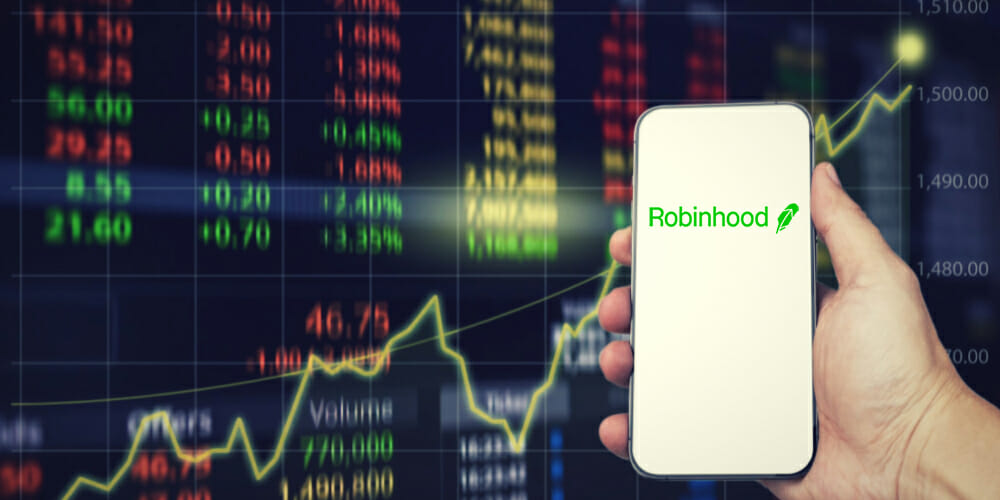When it comes to stocks, everyone wants to know if they can trust the platform they’re using. Robinhood has been a popular option for those looking for a commission-free way to invest. Still, there have been some recent concerns about whether or not the company can legally block certain stocks from being traded on its platform. So, can Robinhood legally block stocks?
The simple answer is yes, Robinhood can legally block stocks. However, the circumstances under which they can do so are somewhat limited. For example, if a stock is delisted from a major exchange, Robinhood may be forced to stop trading it. Additionally, if the SEC or FINRA imposes a trading restriction on a particular stock, Robinhood would likely be barred from trade securities.
This blog post will take a closer look at Robinhood’s move and answer some of its most common questions. So if you’re curious about what’s going on with Robinhood, keep reading!
What is Robinhood?
Robinhood is an American financial services company that offers a commission-free stock trading app. The company was founded in 2013 by Vladimir Tenev and Baiju Bhatt, headquartered in Menlo Park, California.
Robinhood’s mission is to make financial services accessible and affordable for everyone. The company offers a mobile app that allows users to buy and sell stocks without paying commissions or fees. Robinhood also offers a cash management account that gives users access to money without paying fees.
Robinhood has been a disruptor in the financial services industry and has been praised for its simple and user-friendly platform. The company has also been criticized for its lack of customer support and its lack of transparency around its order execution. Nevertheless, Robinhood has become a popular platform for individual investors and continues to grow in popularity.
Stock Trading Restrictions
As the world saw Robinhood restrict trading in GameStop and other stocks amid a frenzy of buying driven by Reddit users, some people began to worry that the trading app was curbing the free market. Recently, Robinhood has put restrictions on the trading of the following stocks:
GameStop [GME]
On January 28, 2021, Robinhood restricted trading on GameStop (GME) and other so-called “meme stocks“ after they surged in value due to buying by online investors. This action by Robinhood sparked outrage among its users, who accused the company of market manipulation. Robinhood has defended its actions, saying it was necessary to protect the firm and its customers from market volatility. Nevertheless, the episode has called into question Robinhood’s business model and led to calls for more regulation of online brokerages.
The story of GameStop’s meteoric rise and fall began in early January 2021 when a group of online investors began buying up the stock in an attempt to drive up its price. The investors were motivated by a belief that the stock was undervalued and that they could make a profit by selling it at a higher price.
AMC Entertainment Holdings [AMC]
AMC Entertainment Holdings is also on the restricted list of Robinhood. On January 28, 2021, the popular stock trading platform Robinhood restricted trading on AMC Entertainment Holdings (AMC) stock. This is likely due to a large amount of volatility and activity surrounding the stock in recent days.
AMC has been a controversial stock recently, with a large group of small investors buying up the stock to force a “short squeeze.” This is where investors who have bet against a stock (by selling it “short”) are forced to repurchase it at a higher price to cover their losses. This can drive up the cost of stock even further.
Robinhood’s decision to restrict trading on AMC may be due to concerns about the potential for more volatility in the stock. It is also possible that the platform is trying to protect its users from potential losses.
However, on February 5th, 2021, the popular stock trading platform Robinhood removed temporary trading restrictions on all stocks, including GameStop and AMC Entertainment Holdings. This move came after intense public pressure and outcry over Robinhood’s decision to restrict trading on these stocks.
Removing the restrictions is a victory for small investors who were heavily impacted by the decision. It also highlights the power of social media and public pressure in holding corporations accountable.
Express [EXPR]
Robinhood has also recently placed restrictions on trading for Express Inc. (EXPR). This has caused quite a stir among investors, with many people wondering why the app would do this.
There are a few possible reasons for Robinhood’s decision.
- One is that Express Inc. is a relatively small company, and its stock is not as widely traded as some of the other stocks on the app. This means that there is less information available about the company, and it may be more volatile.
- Another possibility is that Robinhood is trying to protect its users from making bad investment decisions. If the app allows people to trade Express Inc. stock, which turns out to be a lousy investment, Robinhood could be liable.
So far, Robinhood has not given a clear reason for placing restrictions on trading Express Inc. stock. However, the app is likely trying to protect its users from making bad investment decisions. Only time will tell if this was the right decision.
Naked Brand Group [NAKD]
NAKD is a publicly-traded company with a market capitalization of over $0.68 billion. The company’s focus is on the development and production of EV powertrains and related components.
The company’s share price has been subject to volatile swings in recent weeks, and on January 28th, Robinhood restricted trading in NAKD shares. This move by Robinhood surprised many, as NAKD is a publicly-traded company with a huge market capitalization. NAKD has been a volatile stock in recent weeks, but the trading restrictions imposed by Robinhood are significant and could have a major impact on the company’s share price.
Robinhood’s restrictions will likely negatively impact NAKD’s share price in the short term, as investors cannot buy or sell the stock on the popular trading platform. In the long term, however, the effect of the Robinhood restrictions may be favorable for NAKD, as the company’s share price is likely to stabilize and become less volatile.
Nokia [NOK]
Nokia Corporation (NOK) is a Finnish multinational telecommunication, information technology, and consumer electronics company. It was founded in 1865 as a paper mill company. Still, since the late 20th century, it has focused on telecommunications and technology, with major businesses in network infrastructure, digital health, and licensing.
Nokia was one of the first companies to restrict Robinhood during the GameStop short squeeze. On the same day of January 2021, Robinhood also placed limits on buying NOK. Nokia is one of many companies caught up in the GameStop short squeeze. Other companies that have been affected include AMC Entertainment, BlackBerry, and Bed Bath & Beyond.
The move by Robinhood caused the price of Nokia stock to plummet, and it was one of the worst-performing stocks on the day. It is unclear why Robinhood placed limits on buying Nokia stock, but it is likely due to the high volatility in the stock. Nokia has been one of the most volatile stocks in the market over the past week.
Lawsuit Against Robinhood
On January 2021, Robinhood was hit with a class-action lawsuit over its decision to halt trading in GameStop and other meme stocks or hedge funds. The case was brought by a group of Robinhood customers who allege that the brokerage firm engaged in “unfair and deceptive” practices by executing trades at prices that were inferior to those available on other platforms.
The suit, filed in the Federal District Court for the Southern District of New York, alleges that Robinhood deprived its users of “fundamental rights to fairness and equality” when it restricted trading in specific stocks.
The lawsuit seeks damages for Robinhood users who could not trade on the platform during the market frenzy surrounding GameStop and other meme stocks. It also asks for an injunction to prevent Robinhood from “unfairly” restricting trading in the future.
The suit comes as Robinhood is facing intense scrutiny over its handling of the market frenzy. The company has been accused of catering to Wall Street interests and turning a blind eye to retail investors.
Robinhood has defended its decision to halt trading in GameStop and other stocks, saying it was necessary to protect its users from market volatility.
If the crash impacted you, you might be eligible to join the lawsuit. For more information, you can fill out this form and email it to [email protected].
Maverick Traders
Maverick Traders is a premier proprietary trading company based in the US. This is basically a group of experienced traders specializing in finding and exploiting market opportunities. They train and allow a team of traders to manage and trade their accounts. This gives the traders the potential to earn a high income.
Maverick traders were among the first to raise concerns about Robinhood’s trading practices. They have played a crucial role in the lawsuit against Robinhood. According to the Boston Globe, the lawsuit, filed by residents of Massachusetts and New York, accuses Robinhood of violating state and federal laws by failing to disclose its conflicts of interest. The suit also alleges that Robinhood misled customers about its trading practices.
Is Blocking Stocks Legal or Not?
The legality of blocking stocks is a bit of a gray area. The answer to this question is not a simple one. Some argue that it is legal, while others contend it is not. The legality of blocking stocks depends on the situation and the discretion of the person or institution doing the blocking.
Broad Discretion
The legality of blocking stocks is a broad discretion. This means there is no definitive answer as to whether or not it is legal to block stocks. Each case must be evaluated on its own merits. However, there are some general principles that you can apply to determine the legality of blocking stocks.
- The first principle is that the blocking of stocks must be done in a manner that does not unfairly disadvantage other investors. This means that the blocking must not be done in a way that artificially inflates the price of the stock or otherwise manipulates the market.
- There must not be any violation of laws or regulations is the second principle for blocking stocks. This includes both federal and state laws.
- The third principle is that the blocking of stocks must be done in a way that is transparent and fair to all investors. This means that the terms of the block must be clearly stated, and all investors must have a fair chance to participate.
Applying these principles, it is generally legal to block stocks as long as the purpose of the block is not to manipulate the market or violate any laws unfairly.
Dependent on the Situation
The legality of blocking stocks depends on the situation. For example, if a company plans to go public, the SEC may require that all shareholders agree to a lock-up period during which they cannot sell their shares. This prevents shareholders from flooding the market with shares and driving down prices.
Another example is if a company tries to take over another company, the target company may use a blocking stock to prevent the takeover. However, blocking stock may be illegal if a company tries to acquire a new stake in another company.
Other times, shareholders may agree to a lock-up period to avoid triggering a clause in their contract allowing the other shareholders to buy their shares at a discounted price. Still, other times, shareholders may block their shares to prevent a hostile takeover of the company. In these cases, the legality of blocking stocks depends on the Securities and Exchange Commission’s (SEC) regulations and the terms of the shareholders’ contract.
Double Standard in Trading
The legality of blocking stocks is a double standard in trading. Blocking stocks is when a trader buys many shares and then tries to sell them at a higher price, preventing other investors from buying or selling the stock. This is legal in some countries but not in others. The United States, for example, prohibits this practice.
Some people argue that blocking stocks is a form of market manipulation and should not be allowed. Others argue that it is a legitimate trading strategy and should be allowed. The reality is that the law has a double standard regarding this issue. In some countries, blocking stocks is legal, while in others, it is not. This creates a situation where investors in one country may have an advantage over investors in another.
The United States should reconsider its position on blocking stocks. American investors are disadvantaged if this practice is legal in other countries. Allowing blocking stocks would level the playing field and give all investors a fair chance to make money in the stock market.
FAQs
Do You Get Taxed if You Leave Your Money in Robinhood?
When it comes to taxes, the general rule is that you will only be taxed on the money you withdraw from your account. So, if you simply leave your money in Robinhood, you won’t owe any taxes.
Of course, there are always exceptions to the rule. For example, if you are actively trading stocks and making a profit, you may be subject to capital gains taxes. However, if you are simply holding onto your stocks and not selling them, you probably won’t have to worry about paying any taxes.
How Long Can a Stock Stay Halted?
According to the Securities and Exchange Commission, a stock can be halted for up to 10 business days. However, the stock must be restarted or delisted from the exchange after that period.
There are many reasons why a stock may be halted, but some of the most common include the following:
- The company is undergoing a merger or acquisition
- The company is going bankrupt
- There is an investigation into the company
- There has been a major change in the company, such as a new CEO
- There is news that could potentially move the stock price dramatically
If you own shares of a stock that has been halted, you will not be able to sell them until the stock resumes trading. If the stock is delisted, you may still be able to sell your shares, but it will likely be at a much lower price than before the halt. You should always consult a financial advisor before making decisions about selling or holding stock.
Does Robinhood Automatically Report to IRS?
The answer is yes! As long as you’re using Robinhood to trade stocks and other securities, any gains or losses you realize will be reported to the IRS. This is because all financial institutions must report information on their customers’ transactions to the government. Robinhood must report all earnings and activity to the IRS, so you don’t need to worry about doing it yourself. All you need to do is ensure that your tax information is up to date in the app so that we can accurately report your earnings.
When a Stock is Halted, What Happens to Options?
When a stock is halted, the options on the underlying stock will also be halted. This can cause some confusion for investors, as they may not be sure what will happen to their options contracts.
The agreement will remain if you have an options contract on a stock that is halted. However, you will not be able to trade the contract until the stock resumes trading. This can be frustrating for investors trying to take advantage of market movements.
It is important to remember that options contracts are binding even when the underlying stock is halted. This means that you could be forced to take or make delivery of the underlying stock if the option is exercised. So, if you are holding an option on a stock that is halted, be aware of the risks involved.
Conclusion
In this article, we looked at the legality of Robinhood blocking stocks. While it’s unclear whether they are in the clear, it seems that they may be skating on thin ice. If you are looking for a commission-free stock trading platform, Robinhood is still a great option. Just be sure to research which stocks are available on the platform and keep an eye out for any news concerning blocked stocks.












